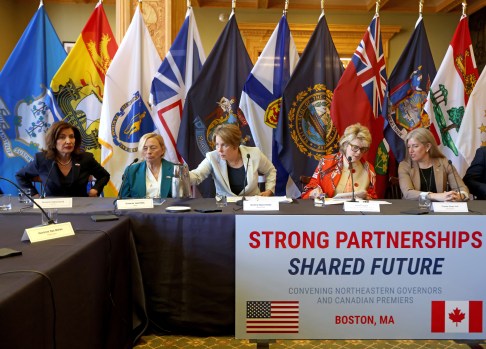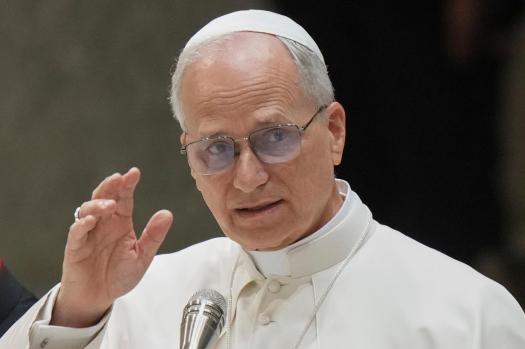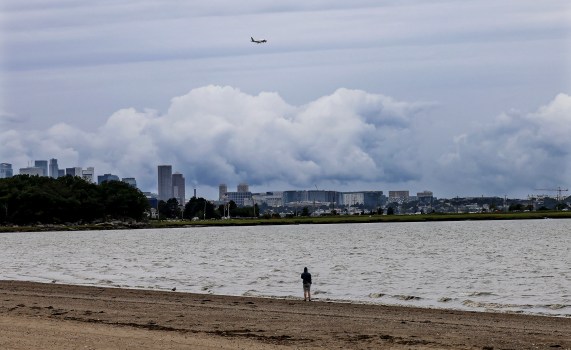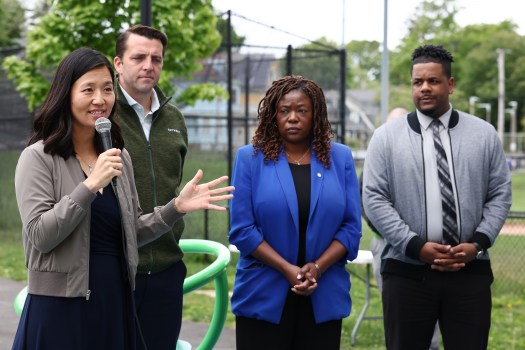As a new U.S. federal policies shift the U.S.’s foreign relationships, tourism has been hit hard in several Northeastern states, a number of governors stated in a wide-ranging conversation with Canadian premiers at the Massachusetts State House on Monday.
“It’s a challenging time,” said Massachusetts Gov. Maura Healey. “I think across the board, we could all say that our tourism numbers, for example, are down anywhere between 20-and-60% in all of our states. We have seen serious impacts and disruption to the supply chain. We have seen impacts that you can’t quite put a price on, but are real concerns about traveling to the United States.”
Tourism was only one of many issues of U.S.-Canada relations discussed between Northeastern governors and Canadian premiers during the “Strong Partnerships, Shared Future Convening” at the State House on Monday morning.
Governors from Massachusetts, Maine, New York, Rhode Island, and Vermont attended, along with the premiers of Prince Edward Island, Nova Scotia, Ontario, New Brunswick, and Newfoundland and Labrador. Representatives of leadership from Québec, Connecticut and New Hampshire also attended.
In terms of tourism, Healey said, Massachusetts expects a 20% decline, and Canadian school trips have reportedly fallen.
“Vermont reports that hotel reservations by Canadians are down 45%,” said Healey. “Credit card spending by Canadians down 36%. In New York City, bookings by Canadians are down 45%. Those are just some examples.”
Asked about tourism to America in the current climate, Premier of Ontario Doug Ford said he “never stopped people from coming down here” and noted how “intertwined” the countries are.
“It’s challenging for us to hear from our fellow colleagues that they’re seeing a massive drop in tourism, and we know that means somebody who’s working at Hampton Beach, like Gov. Healey used to, might be losing their job,” said Premier of New Brunswick Susan Holt. …. “We don’t like to hear that, but what we want to say to them is, you’ve got to make noise. You’ve got to tell your leaders that this is hurting the American economy, that this is hurting jobs in the U.S.”
The leaders discussed recent issues effecting the U.S. states and Canadian provinces, including economic losses from tariffs on trade, skilled labor force exodus as federal research funding is cut, the need for cooperation in areas like energy development and airline routes, and much more.
Related Articles
-
Tax hit on Boston’s White Stadium project now $172M, says Josh Kraft
-
Suspension without pay recommended for judge accused of helping man avoid ICE
-
Massachusetts lawmakers move to preserve bodily autonomy, ban employer coercion
-
Pols & Politics: Karen Spilka compares ICE arrests to Adolf Hitler’s rise to power
-
Boston City Council OKs commission to study office vacancies amid $1.7B budget shortfall projection
Officials noted Canada is the “top trading partner for most states and the single largest foreign supplier of energy” to the U.S., and that America provides the greatest investment in Canada. Northeast leaders cited the countries’ interdependence, noting examples like 80% of Maine’s heating fuel and 50% of Vermont’s energy comes from Canada.
“We had a lot of conversations about what we can do, including continuing by what we’re doing today to show that the Northeast is open for business,” Healey said. “We’re open for trade. We value and respect our Canadian neighbors and their businesses. We look for continued ways we may invest in one another and support one another.”












